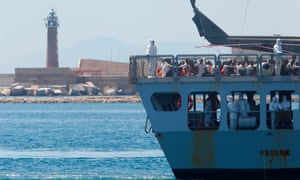The EU is to consider the idea of building migrant processing centres in north Africa in an attempt to deter people from making life-threatening journeys to Europe across the Mediterranean, according to a leaked document.
The European council of EU leaders “supports the development of the concept of regional disembarkation platforms”, according to the draft conclusions of an EU summit due to take place next week.
Migration is high on the agenda of the two-day summit, which opens on 28 June. EU leaders will attempt to reach a consensus on how to manage the thousands of refugees and migrants arriving each month.
The German and French leaders, Angela Merkel and Emmanuel Macron, met near Berlin on Tuesday to agree on a common approach, amid fears in their camps that the European project is unravelling.
Before the meeting France’s finance minister, Bruno Le Maire, said Europe was “in a process of disintegration. We see states that are turning inward, trying to find national solutions to problems that require European solutions.”
He called for “a new European project” on immigration, as well as economic and financial issues, “to consolidate Europe in a world where you have the United States on one side, China on the other and we are trapped in the middle”.
At the end of the meeting, which was dominated by eurozone reform, Macron said the EU would “work with countries of origin and transit” to cut off illegal people-smuggling routes, and build “solidarity mechanisms, both externally and internally”. The EU border and coastguard agency Frontex would be expanded to become “a true European border police”.
Merkel is under pressure from her hardline interior minister, Horst Seehofer, to come up with a European plan by the end of the month. Germanycontinues to receive more applications for asylum than any other EU member state. Seehofer wants German border guards to start turning people away if there is no EU-wide progress.
It was not immediately clear how the EU document’s proposal for “regional disembarkation platforms” would work, or where they might be set up.
Elizabeth Collett, the director of the Migration Policy Institute in Brussels, said it was a “watered-down version” of Austrian-Danish proposals that had called for arrivals in Europe to be sent back to their point of departure to have their claims processed.
“What has clearly changed is the level of political backing for this,” she said.
The plan prompted questions about how it would work and the cost involved, she said. “It looks great on paper, but can you get countries to sign up from outside Europe and basically be vassal states?”
The other big problem was ensuring the centres met EU standards, she said. “The conditions, the processing, all of the things that require a high degree of knowledge and are quite hard to manage within the EU, these are big questions.”
The plan, however, appears to be helping unite EU countries that are deeply divided on migration.
Italy and France support the idea of asylum centres outside EU territory, an idea that helped defuse diplomatic tensions after the two countries clashed when the new populist government in Rome refused to allow the docking of a ship carrying 630 migrants.
Macron, who has previously raised the idea, proposed it when he met the Italian prime minister, Giuseppe Conte, last week.
The EU struck a deal with Turkey in 2016 that drastically reduced migrant flows, but the bloc has found it harder to work with north African governments, especially Libya, from where most sea crossings begin.
The European commission has rejected a Turkey-style deal with Libya because of instability in the country. But Italy’s previous government struck deals with Libyan militia and tribes and helped relaunch the Libyan coastguard. These actions contributed to a sharp reduction in the number of people crossing the central Mediterranean, but critics reported an increase in human rights violations.
According to the draft document, the EU would like to set up the centres in collaboration with the UN refugee agency and the International Organization for Migration, a UN-related body that has previously criticised the paucity of legal routes for African migrants to travel to Europe.
Dimitris Avramopoulos, the EU migration commissioner, is expected to spell out details of the disembarkation centres later this week.






